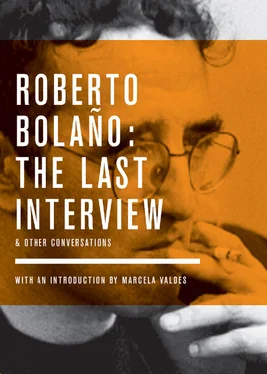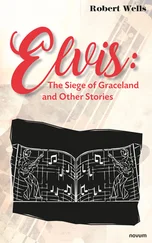No, of course there’s a serial killer, González Rodríguez replied. But it’s not just one serial killer. I think there are at least two serial killers.
This revelation, González Rodríguez says, disconcerted Bolaño. By then, the writer had already devised an elaborate, ingenious structure for his novel, a structure that in some ways depends on the idea of a single serial killer. The innocence or guilt of the real Sharif Sharif wasn’t the issue, González Rodríguez says. The problem was how to fit fresh news about the crimes into 2666 .
Bolaño’s solution, I suspect, was to adopt many of González Rodríguez’s conclusions about Juárez wholesale, then to dramatize these theories in his own way. The parallels between the stories in “The Part About the Crimes” and the conclusions in González Rodríguez’s book Huesos en el desierto —which isn’t available in English — are startling. Yet “nothing,” González Rodríguez points out, “is ever followed to the letter.” Names are changed, nationalities transformed, characters invented, entire plots embroidered out of imagination, style and air. Bolaño may have used everything González Rodríguez taught him — he read the manuscript for Huesos months before it was published — but he refashioned it all to suit his own ends.
THE PART ABOUT THE GOAT
After years of correspondence, the two savage detectives finally met in November 2002, when Gonzaléz Rodríguez traveled to Barcelona for the official launch of Huesos . Anagrama had bought the book for its prestigious Crónicas imprint, setting it alongside works by Günter Wallraff, Ryszard Kapuscinski and Michael Herr. More than 100 people attended the debut presentation. Months later, the Mexican consulate would decline to send a representative to a theatrical performance inspired by Huesos , stating that its officials “don’t support works that denigrate Mexico.”
Huesos was launched in Spain partly to protect its author. When it was printed, many of the government and police officials fingered by González Rodríguez were still in power, and its account of systematic corruption in Juárez angered those who wanted to portray Mexico as a civilized nation. But press coverage for the book in Europe provided González Rodríguez with a measure of protection against reprisals. After such coverage, there would be no way of making the book or its author quietly disappear when Huesos was later released in Mexico.
Bolaño didn’t attend the launch, but early the next day González Rodríguez and a friend headed north to the seaside town of Blanes to meet him and his family for lunch. They arrived several hours late. Hung over from the previous night’s celebration of dinner and absinthe, González Rodríguez and his friend had boarded the wrong train. Bolaño forgave their late appearance, opening a bottle of wine and offering ham sandwiches. Knowing that Bolaño’s illness made it impossible for him to drink liquor, González Rodríguez had brought him a half-kilo of coffee from La Habana, the cafe in Mexico City that Bolaño immortalized in The Savage Detectives . Bolaño’s liver was so bad that he couldn’t drink coffee either, but González Rodríguez recalls that he opened the bag and buried his nose in it.
For the next several hours, they talked about the murders in Juárez. For once, they had no worries about tapped phones or intercepted e-mails. Bolaño could ask all the questions he wanted.
Listen, Bolaño joked, I’m going to make you a character in my novel. I’m going to plagiarize the idea from Javier Marías, who made you a character in La negra espalda del tiempo .
González Rodríguez felt his stomach sink. Really, Roberto? he said. With my name?
Yes, don’t worry about it, Bolaño said. His daughter, Alejandra, was playing with González Rodríguez’s friend. Bolaño looked happy. González Rodríguez didn’t know what to say.
The next evening they met for sushi in Barcelona. This time they talked, not about Juárez but about literature. Bolaño asked if writers in Mexico still wore beards or if they’d all cut them off. At one point, he announced that he and Mario Santiago had officially dissolved the Infrarealist movement in Paris in 1992. He’s crazy, González Rodríguez thought. He thinks that the only Infrarealists who matter are him and Santiago.
Shortly after this visit, Bolaño published the essay “Sergio González Rodríguez Under the Hurricane,” which declared his affection and admiration for the journalist and sang the praises of his book. González Rodríguez’s “technical help in the writing of my novel,” he wrote, “has been substantial.” And Huesos en el desierto is “not only an imperfect photograph — how could it be anything else — of evil and of corruption; it also transforms itself into a metaphor of Mexico and of Mexico’s past and of the uncertain future of all of Latin America.”
Seven months later, on July 1, 2003, Bolaño was admitted to a hospital in Barcelona. Two weeks later, he died.
When 2666 was released in Mexico in 2004, González Rodríguez could barely bring himself to read it. “It took me months to read the section about the dead women,” he says. “It terrified me. To live through it is one thing, but to see it told by a great literary master like Bolaño isn’t funny. Roberto is crazier than a goat, you understand? You can’t believe it because in some way you’re there.”
As a reporter, González Rodríguez had cultivated a critical distance that helped him ignore how easily he could be attacked again. Finding in 2666 a character with his name pinioned to a world of killers and cover-ups shattered that illusion. At one point Bolaño even describes a kidnapping exactly like the 1999 attack on González Rodríguez, except that it ends in death. It’s not clear whether the reporter who dies is the character “Sergio González.”
Such pointed mind games aside, any Mexican journalist writing about cartels or corruption would have felt vulnerable in 2004. That year, five investigative reporters were killed or disappeared in Mexico. One of them was shot to death in front of his two young children. According to a report put out by Reporters Without Borders in 2007, Mexico has become the second-most dangerous place in the world for journalists, the first being Iraq. Alejandro Junco de la Vega, the president of Grupo Reforma, told an audience at Columbia University in October 2008 that his three newspapers no longer run bylines, in order to protect their journalists. “We find ourselves under the siege of drug lords, criminals,” he explained, “and the more we expose their activities, the harder they push back.” Junco himself has moved his entire family to “a safe haven in the US.”
So it may be a coincidence that the same year 2666 was published, González Rodríguez decided to stop traveling to Juárez. He’d heard there was a bounty on his head in the state of Chihuahua. Suits alleging slander had been filed, and he risked being jailed the moment he set foot in the state. Given these maneuvers, his lawyers recommended that he not enter Chihuahua under any circumstances. (It wasn’t until April 2007 that President Felipe Calderón signed a federal law that decriminalized defamation and “insults,” and obliged state governments to do the same.) The last time González Rodríguez visited, nobody wanted to talk about what was going on. It had become a city of closed doors.
Neither Huesos nor 2666 is an easy book to read. I was plagued by nightmares as I read both of them. Their pages are like freshly dug graves, but they are shadowed by different philosophies of evil. In Huesos, Juárez is a casualty of rampant corruption. When cops and courts look the other way, González Rodríguez believes, brutal acts become ordinary events. The rape and murder of women, the assassination of journalists, the kidnapping of people for ransom: none of these crimes are page-one news in Mexico anymore. “A malevolent person, like a serial killer, can unleash a kind of sweeping effect,” González Rodríguez says, igniting a mechanism of extermination that rivals that of any totalitarian dictatorship. This “normalization of barbarism,” he argues, is the most serious problem facing Mexico and Latin America today.
Читать дальше












